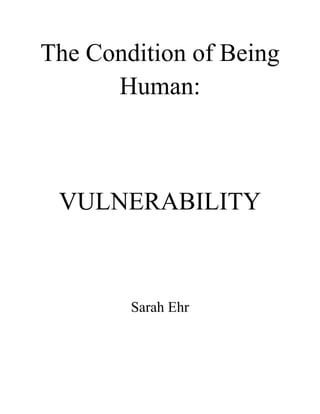
The Condition of Being Human
- 1. The Condition of Being Human:<br />VULNERABILITY<br />Sarah Ehr<br />What makes humans, humans?<br />What is it about the human condition that makes us so vulnerable to influences, addictions and vices?<br />Table of Contents<br />Page 1 …………… Addiction Research Paper<br />Page 2 ……. Requiem for a Dream Synopsis<br />Page 3 …………. Requiem for a Dream Essay<br />Page 4 …...….. Addiction Personal Response<br />Page 5 ………... Requiem for a Dream Visual<br />What Causes Addiction?<br />Individuals who fall victim to the power and pull of addiction cannot always be blamed for the predicament they find themselves in after they become mentally and physically dependent on their vice. Though all cases are unique, the majority have certain characteristics that allow insight into the particular causes for that particular person becoming an addict. The condition of being human makes all vulnerable in certain ways but many are unique to the individual in question, and due to this some types of personalities are more prone to addiction than others. What is truly fascinating about addiction is the effect it has on the brain, and why it appeals so much to people in some cases and so little in others. <br />Defining addiction has been a task many scientists and psychologist have struggled over since the term was first used. The present definition states that addiction is a physical and psychological dependence on substances that temporarily alter the chemical balance of the brain. When chemical stimulants are added to the delicate balance in the brain, there are profound effects that drastically alter all of an individual’s daily processes. Nearly all addictive drugs target the brain’s reward centre by flooding it with dopamine, the “feel-good” hormone. The result is a “high” that gives the drug abuser incentive to continue use, for it is more reward than they have received for doing anything else. However after continued exposure to the drug, the brain naturally produces less dopamine to cope with the recent influxes while on the stimulant. A lessened amount of dopamine not only while on the drug but in everyday life causes the drug user to no longer find pleasure in activities they once did, and rely on increased doses of their vice to provide the “high” again. The desperation that an individual feels to get their high often overwhelms their common sense, as many addicts are aware of the consequences of their actions but are too obsessed with their next “fix” to care. The drugs that these individuals are on provide more reward than food, personal relations, or everyday activities many people find happiness in doing. At this point, the addict would go through immense withdrawal if they were to cease using the drug, because their brain and body now completely depend on it for dopamine.<br />While the brain processes are a fascinating subject, even animals have become dependent on addiction when humans have experimented on them. What makes addiction related to the human condition is why some individuals are more susceptible than others to use drugs continually to the point of dependency. One theory of this is the “self-medication hypotheses.” The basis of this theory is that in some cases certain individuals abuse drugs in an attempt to self-medicate their seemingly intolerable states of mind. Evidence of this theory is present in schizophrenics, as 90% are seen to be addicted to nicotine. When a person has survived a disaster they are also more likely to abuse drugs, as they often have post traumatic stress disorder and depression, which they try to relieve the symptoms of through drugs and alcohol. Stress has also been long recognized as a major contributor to drug cravings and relapse which further supports the theory where drugs are not chosen randomly but for their pharmacological effect. Other characteristics such as obsessive compulsive disorder can create a basis for addiction not due to self-medication but because the compulsions are impossible to control. Also some individuals rely on drugs or alcohol to release emotions such as anger or sadness that they cannot express normally, or they need to be “high” to have normal social interactions with people.<br />More theories suggest that abnormalities in social development play a role in which individuals are more susceptible to addiction. Typically, the accepted perspective on development is that over the course of life circumstances change and new social roles are created while old ones are abandoned. Milestones through these circumstances are hit or missed, and those missed milestones are particularly detrimental to individuals and can contribute to drug abuse. Often in cases where adolescents enter a more adult role earlier or later than their peers, the developmental perspective predicts negative consequences will result, including drug and alcohol use either immediately or later in life. The “mid-life crisis” can also cause drug and alcohol abuse due to the use being unsatisfied with their present life, and seeking some sort of excitement, perhaps because they missed a stage of excitement in their youth or have less people depending on them currently and no longer need to fill an “adult” role.<br />While the most prominent and dangerous addictions are to drugs and alcohol, any activity that stimulates the reward centre of the brain can be addictive as well, such as video games, shopping, gambling, even religion. Although these are common daily activities for most people without having addictive potential, certain personalities such as those with OCD, depression, PTSD and other mental illnesses are prone to addiction to any rewarding activity. Similar to the self-medication theory, the escape individuals find in their daily vice provide a way for them to cope with their symptoms and daily life to the point that without them <br />